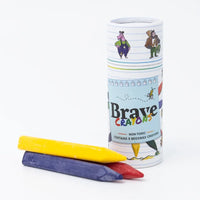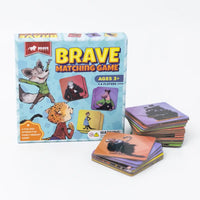Imagine the most important person in your life constantly turning you away with, “not right now. I’m busy.” How would that make you feel? You’d probably feel hurt and eventually learn to disconnect and seek connection somewhere else. Our kids are no different. In fact they are biologically wired to seek connection and safety from their parents. When they are constantly told, “no,” to this basic need for healthy development they learn to shut down - because they have to.
It has been proven time and time again that children who spend quality time with their parents perform better academically, have stronger family bonds, are better parents themselves, have less behavioral problems, are less likely to engage in acts of violence and substance abuse, have less mental health problems, have greater confidence and happiness, have better conflict resolution skills, and have more overall success.
But busyness is inevitable in our modern world, whether you are a stay at home mom, or a workforce dad or mom. So, how do we prevent it from cutting us off from our children?
Here are five proven ways to help from the creators of the BRAVE Family Plan:
1. Apologize and Acknowledge
Healthy relationships are built on trust, safety, and sacrifice. It’s easy to unknowingly get into a habit of NO-ing away our kids. Over time our kids will not feel safe presenting their needs to us, because they will not trust that we want their best. Acknowledge that to your child. Tell them the problem, present the solution, and ask for forgiveness.
Owning up to our mistakes is the first step in laying the groundwork to regain any lost trust. Apologizing to our children is also a way to connect with them, and model conflict resolution. Acknowledge that moms and dads aren’t always perfect and lay the groundwork of how you prepare to intentionally do a better job of prioritizing their needs. For example, “every day this week mommy is going to set a timer and we are going to spend 20 minutes of uninterrupted time together reading.”
2. Keep a Calendar
Yes, it might sound ridiculous to have to schedule time to spend together as a family, but if you are trying to create a new habit, putting it on a calendar is both a visual and mental accountability that you are prioritizing this event. A wall calendar works really well to get everyone on the same page and gives kids a visual of what to expect. Every day, commit to giving two segments of at least 20 minutes of your undivided attention to your children. You can’t force quality time, but you can provide a good foundation for it. The best way to do that is through uninterrupted quantity time.
Families who keep a family calendar are more likely to spend meaningful time together, and this is why we made it a priority to include in our BRAVE Family Plan.
3. Clearly Communicate Your "Yes!"
The reality is that we can't always do what our kids are wanting, in the exact moment they ask - and that is okay. However, the way we frame it to our children can make or break the moment. You’ve probably heard the rule tell kids what to do, instead of what not to do. Similarly, tell kids when they can do something rather than when they cannot do something. So, instead of this:
Child: “Can you help us build a fort?”
Parent: “I can’t right now, I’m folding the laundry.”
Child: “Can we when you’re done?”
Parent: “Well, then I need to put the clothes away. Maybe we can build a fort tomorrow.”
In this scenario, all our kids hear is, “no, I don’t want to build a fort with you.” For a child, this feels like rejection - over and over again. Try this instead:
Child: “Can you help us build a fort?”
Parent: “Yes! That sounds like fun. I should be done with the laundry in 15 minutes. Do you want to help me so that it goes faster?”
Rather than giving a negative response, “not right now,” you provide them with a positive response, and clear expectations. This works for any duration of time even if you are unable to get to it within the day.
Child: “Can we please go to the park?”
Parent: “ Yes! I would love to take you to the park. Today Grandma and Grandpa are coming to our house. Would you like to go tomorrow morning or on Thursday morning?”
Children may still express some level of disappointment over not getting to go when they were hoping to, but what you’ve done is removed the negative response, the feeling of rejection, and eliminated the power struggle by providing a choice.
Try this next time, and watch it transform what could be a moment of rejection into a moment of connection!
4. Ask Questions
Asking questions helps us to connect with our children, and presents them with an opportunity to feel heard. But what should we do when our kids only answer us, “good,””fine,” or “I don’t know.” And how do we get them to open up in general? Here are some tips to help:
- Wait. If you’re picking your kid up from school, Sunday school, or a friend’s house it is normal to want to ask, “how was school?”,”What did you learn today?”, “Did you have fun?” But for your child it can be overwhelming. They are likely exhausted and overwhelmed. Instead, hold the questions and focus on reestablishing safety and security with your child - “Hi, [child’s name]! I’m so happy to see you. I missed you while you were at school. Mom/Dad is going to be so excited to see you when we get home.” After you’ve given them some time to reorient then try asking your question. It can help to be a little silly. So instead of, “how was school?”, you can ask, “was there a loose chicken running around the cafeteria today?” This helps to lighten things up, while serving as a visual reminder of what actually happened while at school.
- Invite your kids into your routine household chores. This doesn’t mean to ask them to help with your chores every time (unless they are toddlers - toddlers love to help out). The goal is to communicate to your child that you enjoy being around them, you want to spend time with them, and you value their input. Here are examples of what this could look like: * “[Child’s name], I am going to be changing my sheets and putting my laundry away. Would you want to sit in my room while you play your switch? I really just enjoy being around you.” * “Hey, [child’s name]. Since you are practicing your violin, would you come practice it in the kitchen while I do the dishes? I really love listening to you play.” * Hey bud, I am going to grill these steaks. Would you come pick out a good playlist for me to listen to, and tell me about your new game?”
- Be Specific. Oftentimes when we ask generalized questions our kids give us short answers because they don’t even know where to begin. Being specific gives kids a starting point. Instead of, “how was your day?,” ask “What was a good part of your day today?” Instead of, “What did you learn today?,” ask “Did anything interesting happen in your science class?” Conversation cards are a really great and easy way to get your kids talking. Each card asks a specific question, and the best part is you get to hear your kid(s) answer questions you might not even think to ask.
- Play it cool. If you ask hard questions, expect hard answers. Never act disgusted, scared, angry, or disappointed when your child answers your question. This can be hard, but it’s so important. When you react negatively towards an answer to a question you asked, it communicates to your child that you are only interested as long as you agree with the answer. If you receive an answer that concerns or bothers you - that is a win. It means there is honesty, and it is important to maintain that. If you feel like there are things worth addressing - process through your thoughts, take it to the Lord, and come back at a later time.
The conversation cards in our BRAVE Family Plan are designed specifically to help kids open up, give thoughtful answers, and be a more considerate member of their family. Kids who are asked questions ask questions.
5. Repetition Covers a Multitude of Sins
Kids thrive off repetition. Adults do too, actually. It’s how we study for tests, learn a new skill, memorize scripture, etc. .. It’s also one of the ways we show someone we love them. You’ve probably heard, at some point, the line “ but you never show me.” This usually comes from a spouse longing for regularity in our actions, “you say you love me, but you never show me.” Kids long for the exact same thing - repeated actions of love. This doesn’t have to be complicated or overwhelming.
Shoot for the 70/30 rule. You do it consistently 70% of the time. No need to stress out about missing these moments due to sickness, being out of town, or life getting in the way. Just aim for 70% of the time. It can be as simple as going into their room every night before bed and talking through the highs and lows of their day and yours, reading a book together before bed, dinner time conversation-starting questions, family game nights, cinnamon rolls every Christmas morning, etc.
Just choose one thing and commit to repeating it while your child is under your roof. Traditions make strong families. Your child’s nostalgic memories as an adult will be whatever was repeated throughout their childhood. “I grew up reading BRAVE Books!” “Growing up my parents would always go around and ask each of us fun questions while sitting to eat dinner.” “Every Friday night we had a family date night.” Repetition is like a loud voice in our brains that helps make core memories. So let these repeated acts of love speak louder in the minds of our children than our inevitable shortcomings, because love really does cover a multitude of sins (1 Peter 4:8).
These 5 tools aren’t meant to add on to your already full plate. These are tools that simply get worked into the daily rhythms of your current life, and help you to think intentionally about the interactions you have with your children on a day to day basis. Whether you are a stay at home mom, or a workforce dad or mom, we all need daily reminders to be present with our children. The numerous benefits for children with present parents is a priceless blessing. God has gifted us his children to steward for His glory. May we never lose sight of that.
If you’re looking for more resources that can partner with you as you say “yes” to intentional parenting and building a stronger family, sign up for the BRAVE Family Plan and get resources and activities that make family time fun and fruitful! These tools are sent right to your doorstep every month for an entire year. This includes a family calendar, a new books every month that will teach you instill a Biblical value in your children, and family activities to look forward to all throughout the month. The BRAVE Family Plan equips you with the tools necessary to create an unbreakable family bond, and build confident and resilient kids.













